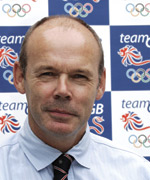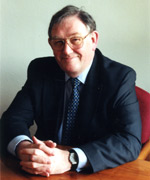Thursday 12 July 2007 afternoon ceremony
Sir Clive Woodward
Ray Dillon
 Sir Clive Woodward (LLD) Sir Clive Woodward (LLD)
Sir Clive was educated at HMS Conway Naval School and Loughborough University where he obtained a degree in Sports Science. He captained Loughborough University’s rugby team and moved on to play for Harlequins and Leicester, two of England’s most successful rugby clubs. He represented England on 21 occasions and toured twice with the British Lions. Whilst playing, Sir Clive’s business career flourished and his positive contribution within the UK marketplace was recognised when his employers Rank Xerox offered him a senior role in Sydney.
Returning to England five years later with his wife and family, he established his own computer leasing company in Maidenhead and began his remarkable career as a rugby coach with the nearby Henley club. During this time, he combined his coaching and business careers to great effect, and following highly successful seasons of coaching at London Irish, Bath and with the England Under 21s, he was appointed by the Rugby Football Union as England Rugby’s first full-time professional Head Coach in 1997.
He immediately transformed the traditional practices of previous set-ups, introducing business principles, setting long-term goals, paying attention to detail and planning the personal development of individuals in the basic skills, tactics and strategy of modern rugby.
The resulting transformation of the national side led to England at last beginning to beat the world’s most historically dominant teams on a regular basis. England’s rise to number one ranking in the world was achieved with a record-breaking sequence of victories, and ultimately led to glory with victory over Australia in the Rugby World Cup Final in Sydney 2003.
On his return from this unique sporting achievement, Sir Clive was rewarded with a knighthood and was quickly appointed to head up the next greatest challenge in world rugby – leading the British and Irish Lions to New Zealand in 2005. Ultimately this was to prove a disappointing tour, with the Lions losing the Test Series.
Later that year, Sir Clive entered the world of football, joining Southampton FC as Technical Director. Less than six months into his new role he was promoted to the position of Director of Football, a position he held until September 2006 when he accepted a newly created and tremendously exciting full-time position with the British Olympic Association as their Director of Elite Performance.
This new role will see Sir Clive working in partnership with UK Sport and the 35 Olympic disciplines and their respective athletes, coaches and performance directors to maximize the success of Team GB’s participation in the 2008 Beijing Games and the 2010 Vancouver – Whistler Winter Olympics, culminating with the London 2012 Olympics.
 Ray Dillon (LLD) Ray Dillon (LLD)
Born in Burnley and educated at St Bede’s College, Manchester, Ray Dillon went on to read Ancient and Mediaeval History
at Manchester University. He became a graduate entrant into the civil service, spending most of his time in the Ministry of Labour until he was seconded to HM Treasury’s Centre for Administrative Studies where he went through a crash course in Economics and Statistics. Part of this extended stay was to be familiarised with industry, which prompted him to leave the Civil Service to join the Carborundum Group specialising in the logistics of production and distribution. This included a spell at the famous Spode Pottery. There followed a period with Ideal Standard before he joined The Renwick Group, completing a management buy out of Renwicks Garages in 1982. He is still Chairman of the company.
Ray Dillon has enjoyed a parallel career in the arts, having been Deputy Chairman and Chairman of the Bournemouth Symphony Orchestra, served a six year stint as a Director of The Regional Arts Board for the West Country and Chairman of the South West Academy of Fine and Applied Arts. He has close links with The Theatre Royal in Plymouth and the Northcott Theatre in Exeter.
His links with the University of Exeter go back to 1974, when he became involved with the late David Cawthra in an extended period of sponsorship of the University Symphony Orchestra. In 1996 he was a founder member of the University Business Leaders Forum, which is still flourishing. He then became involved with the University Sports Scholarship scheme and has been a corporate sponsor since its inception. In 2005, with the University of Exeter events team, he organised and helped raise the funding for the Jubilee Gala Concert given by the Bournemouth Symphony Orchestra
to mark the end of the University’s Golden Jubilee year.
He is a governor of Dartington College of Arts and also the Chairperson
of Clydesdale Bank in Exeter.
|






